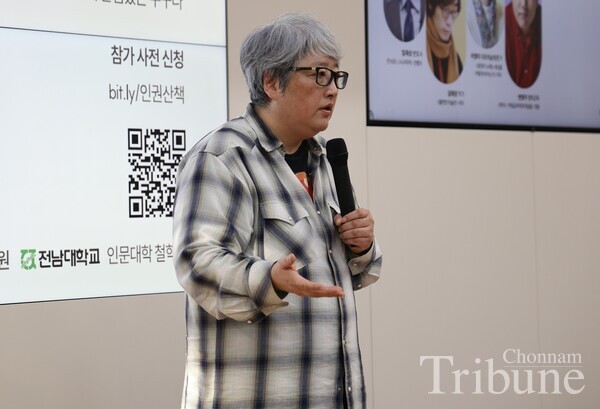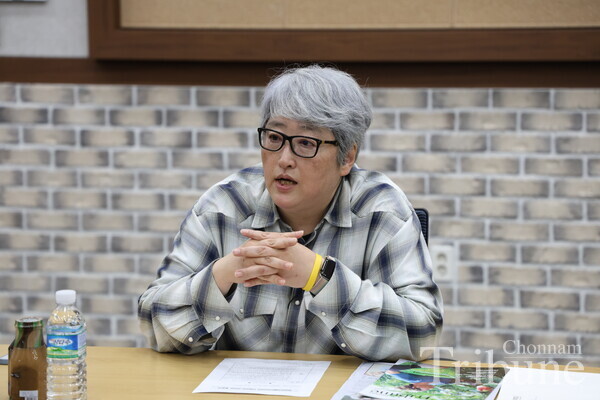In this section, the Chonnam Tribune introduces Director Byun Young-joo, who hosted the 2025 Gwangju Women’s Film Festival. She appeared on the well-known TV series “Movie Room” and received the 48th Baeksang Arts Award in 2012. On Oct. 27, she visited Chonnam National University to deliver a lecture as part of a series on culture and human rights. – Ed.

The Korean film industry, much like many sectors of society, remains heavily male-dominated. According to the Korean Film Council, men make up about 80 percent of directors and lead actors. Despite these structural barriers, one remarkable director has not only proven her talent but has also become one of Korea’s most respected voices: Byun Young-joo. She directed “Praying Mantis: The Killer’s Outing,” a recently completed TV drama, and is renowned for her deep focus on human rights and social issues. The Chonnam Tribune interviewed Byun to learn more about her life and work.
Becoming a Movie Director
Before entering university, Byun lacked comprehensive guidance on choosing a major and planning a longterm career path. She decided to enroll in law, a common choice among students at the time, but her studies in law quickly diverged from her expectations. She said, “Honestly, I did not enjoy studying enough to become a legal professional. After taking the “Introduction to Law,” I realized that this field was incompatible with my interests.” Consequently, she did not remain academically focused on her major during the rest of her university years.
However, her career trajectory was reshaped by her university experiences and gradually steered toward cinematography. Having lost interest in her original major, she proactively sought to expand her academic horizons by taking a women’s studies class. As part of this course, she and her classmates produced a short film as a project assignment. This invaluable experience served as the defining moment that cemented her decision to commit to a professional career in cinematography. “I really enjoyed making it, and I felt that even if the scale of the film grew larger and the story became longer, I would still find it enjoyable to work on.” The class project provided fertile ground for the development of her successful career in cinematography.
Understanding Distinction
Byun recalled that, at first, she often thought about making films in the form of documentaries. “I realized that if I wanted to tell a story, I needed to have a deep understanding of the people and the spaces where their stories unfold.” For her, the format that best fit this idea was the documentary. Her work in documentaries began with Live a Woman in Asia” (1993) and “The Murmuring” (1995), both of which focused on women in vulnerable positions.
However, she does not consider herself someone who specifically set out to make films about women’s issues. The reason she created “The Murmuring,” which gives voice to the victims of imperial Japanese sex slavery known as “comfort women,” was not so much to address the issue itself, but rather out of her curiosity over how these women’s lives would change after revealing the painful truths they had long kept hidden. “Since I started with documentaries, I came to realize that my perspective broadened through capturing their real lives on camera.”
There is a saying that one should see the forest, not the trees. Yet, while filming the film’s subjects, now grandmothers, she came to realize how unique each tree truly was. The trees that make up the forest were too distinct to be summed up simply as “the forest.” “I learned that only by looking closely at each tree can you truly see it — and I think that mindset has deeply influenced all of my later works.”

Realizing the Connection
She has also been participating in various civic movements and rallies outside of her filmmaking, making her voice heard on social issues. Yet, she does not consider herself an activist. She said that she simply supports those who dedicate themselves to activism because she deeply respects them. In 2012, the dismissed workers of Ssangyong Motors staged a sit-in in front of Deoksugung Palace in Seoul, which she witnessed. “The workers asked me to come and host the event, and on my way there, I started thinking to myself — what do these people have to do with me? I don’t drive a Ssangyong car, and I don’t even know anyone who does. So how is their struggle connected to my life?” That was the question she asked herself.
“Then I realized — if more people had the small luxury of going to the theater with their families on a Friday night and having dinner together afterward, it would actually benefit all of us.” She came to understand that the more people could afford a movie ticket, the better it was for her as well. That was when she began to feel a real connection between herself and the dismissed workers. “If they get their jobs back, maybe they’ll be able to go see a movie on a Friday night — that’s what I thought.”
A Little Time to Breathe
Some people find certain scenes in a film thrilling, while others may feel uncomfortable or even deeply saddened by them. Director Byun said, “When I’m making a film, it’s mine — but the moment it’s shown to the world, it belongs to the audience. I don’t think there’s a right or wrong way to interpret a movie.” In that sense, she does not believe that delivering a message through her films can transform society or change someone’s life. She explained, “I don’t produce films to make the world a better place for the underprivileged. I just want to provide a moment of relaxation for them.” The films of Byun Young-joo reflect both a deep awareness of social issues and a compassionate perspective on the underprivileged.
By Kim Jong-hyo, Editor
